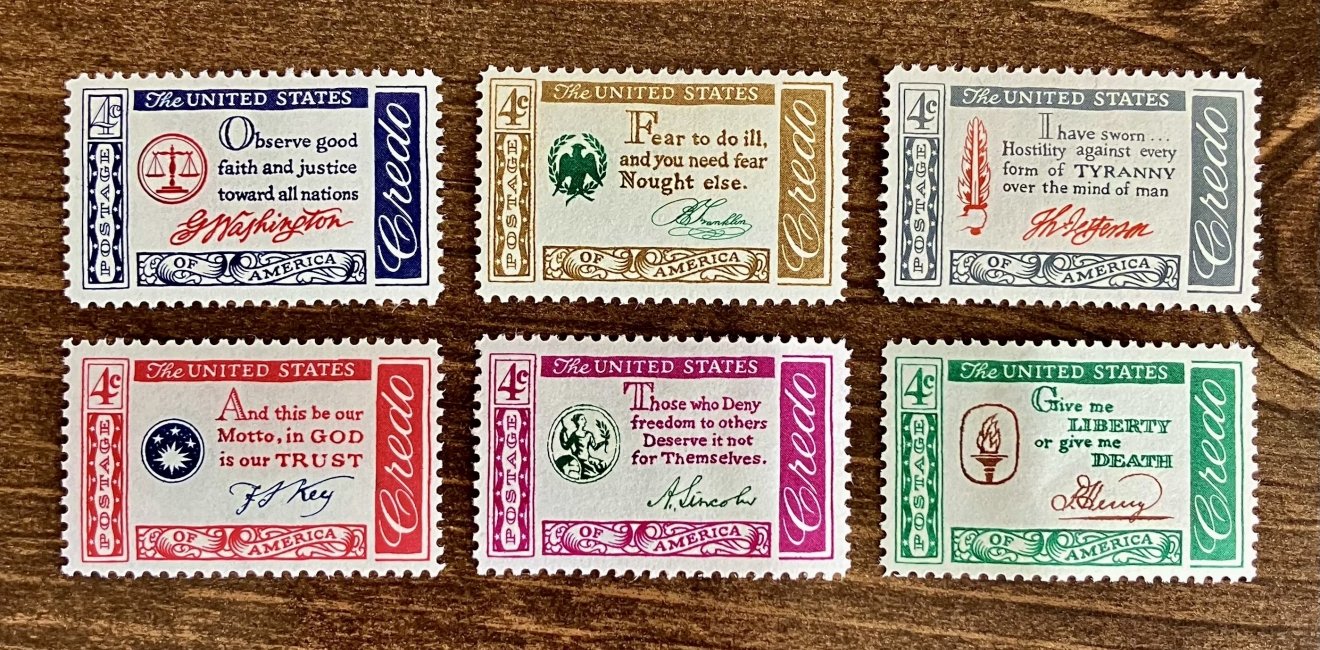“Our American Credo”: The US Post Office and the Cold War
Between January 1960 and January 1961, the US Post Office issued six stamps with different quotations symbolizing American ideals, or “credos."

A blog of the History and Public Policy Program
Between January 1960 and January 1961, the US Post Office issued six stamps with different quotations symbolizing American ideals, or “credos."

According to Our American Credo, a 1960 film by the US Post Office, ordinary Americans could play their part in the Cold War simply by dropping a letter in a mailbox. Matt Crowley, the film’s narrator and none other than the familiar voice of Batman in The Adventures of Superman radio show, points to the power of postage stamps to spread political messages.
“Each stamp can be a miniature portrait of America,” asserts Crowley, “a silent ambassador to our friends across the sea.”
Crowley captivates his American audience with a story of a friend in Hungary, where a democratic uprising had recently been crushed by the Soviet Union. Crowley wants to encourage his friend—who is “fighting the same battle that Washington, Jefferson, [and] Patrick Henry once fought”—but is hesitant to include anything in a letter that might betray him to communist postal authorities. So, he writes a letter simply saying he is glad his friend is doing well, and on the envelope, he uses a US stamp featuring a quotation from George Washington: “Observe good faith and justice toward all nations.”
Crowley declares that in the letter there is “no mention of democracy,” but based on the inscription etched into the stamp, “I think he’ll get the message.” Set against the all-American backdrop of Mount Vernon and with swelling violins in the background, the camera zooms in on Crowley’s hand dropping the letter into the mailbox, framing this as an everyday act of defiance and a strong message from a US stamp.
Between January 1960 and January 1961, six stamps were issued with different quotations symbolizing American ideals—or “credos”
Observe good faith and justice toward all nations.
Fear to do ill, and you need fear nought else.
I have sworn…hostility against every form of tyranny over the mind of man.
And this be our motto, in God is our trust.
Those who deny freedom to others deserve it not for themselves.
Give me liberty or give me death.
When the film was released in late 1960, Americans could borrow a copy for free from their local post office. A search of Newspapers.com for Our American Credo reflects the variety of venues where the film was shown, from a stamp club meeting in Santa Cruz, California, to a television station in Columbus, Ohio, to a Parent-Teacher Association meeting in Coal City, West Virginia.
When the Post Office was trying to decide which quotations to use, it sent a list of possible quotations to a group of prominent historians, the presidents of all state universities, and leading public figures, asking them to rank the quotations. According to the film, “Amazingly enough, [there was] almost unanimous agreement on the same six quotations to start the series off.”
However, a memo written by the deputy director of the US Information Agency, who also served on the Post Office’s stamp advisory committee, reveals the role of the USIA in curating these stamps. In reality, the group that was surveyed selected a different Washington quote: “Let us raise a standard to which the wise and honest can repair.” USIA thought this quote unsuitable and offered “to supply a new quotation for Washington which will better serve foreign policy objectives.” Viewers of the film would have been unaware of the involvement of so many non-postal officials.
A subsequent internal memo sent to USIA’s media divisions suggested some ways the new stamp could be tied into stories about US diplomatic initiatives:
"While our output should avoid giving the impression that the U.S. is overworking the instrument of the postage stamp as a propaganda device … We can use, without undue overplay, the coincidence of our Post Office Department issuing on Jan. 20, 1960 a U.S. Government stamp carrying the credo “Observe good faith and justice toward all nations” at a time when we are engaged in international negotiations at several points on the globe. In addition, the U.S. will be preparing, at that time, for a four power summit meeting, a ten-nation disarmament meeting, plus others."
The four power summit meeting was derailed after an American U-2 plane was detected 1,200 miles inside the Soviet Union. Before anyone could notice the contradiction between the message on the stamp and the American spying operation, the next stamp in the series was already on its way to the printing press. Its quotation was slightly more candid: “I have sworn … hostility against every form of tyranny over the mind of man.” By swearing both “faith and justice” and “hostility,” the US Post Office revealed the true nature of Cold War global gamesmanship.

A leader in making key foreign policy records accessible and fostering informed scholarship, analysis, and discussion on international affairs, past and present. Read more


The Cold War International History Project supports the full and prompt release of historical materials by governments on all sides of the Cold War. Read more



